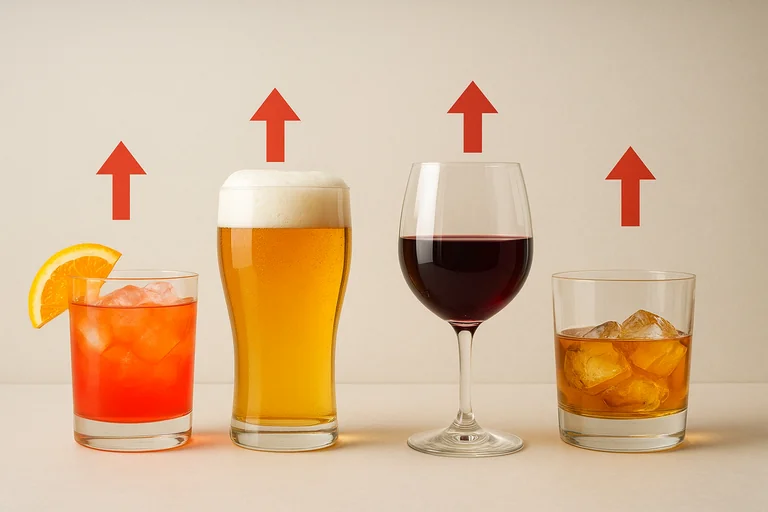A 2 minute assessment to get a personalized mental health or alcohol recovery plan.
You did it. You made it to your first weeks of quitting. You expected to feel amazing, clear-headed, and full of life. Instead, you feel… exhausted. A deep, bone-weary fatigue has settled in, and no amount of sleep seems to touch it. This is sobriety fatigue, and it's one of the most common, yet least talked about, challenges of early recovery.
What You'll Discover:
- What to do when you experience profound exhaustion in early sobriety
- Steps to take to support your body's healing process and restore energy
- The importance of understanding why sobriety fatigue happens and how long it lasts
The idea of feeling exhausted after quitting alcohol may be surprising to some people, but it's actually been a documented part of the recovery process for decades. When traditional expectations about feeling better immediately fail repeatedly, causing widespread confusion and discouragement, many people assume something is wrong with their recovery. With modern understanding of alcohol withdrawal and recovery physiology, evidence-based support strategies and other recovery tools now available, it's actually very straightforward to understand what's happening to your body and how to address this exhaustion effectively.
So, how does sobriety fatigue work exactly? It's actually much more complex than you think with multiple body systems involved in the healing process.
Do Your Research About Recovery and Energy Restoration
Before you begin taking steps to address sobriety fatigue, it's important to learn about the recovery process and what your body goes through when healing from alcohol dependence. In particular you want to look up information on:
- How alcohol affects your nervous system and energy production
- What chronic alcohol consumption does to your brain and body
- What timeline to expect for energy restoration in recovery
Medical conditions are caused by different factors, and sobriety fatigue is the perfect example. It's not just for people with severe alcohol use disorder who drank heavily for years. It's also appropriate for people who want to understand why even moderate regular drinking can cause significant fatigue when you stop.
No matter what your drinking history, it's always best to know as much as you can about the recovery process before experiencing these symptoms yourself.
Choose to Support Your Recovery Process
The next part takes comprehensive support as well. You'll need to understand the difference between normal recovery fatigue and symptoms that might require medical attention. This is an extremely important distinction that goes well beyond just hoping you'll feel better eventually.
You'll want to make sure that you understand the timeline and strategies for supporting your body's healing to ensure you get the energy restoration you're looking for. Experience with recovery support is also extremely important. Healthcare providers who have been helping people through early sobriety for years and specialize in addiction recovery are going to be well-equipped to help with proper guidance and support.
Take an Assessment of Your Recovery Needs
The recovery specialist you choose should evaluate your specific situation to determine what type of support will be most helpful for your sobriety fatigue. This is a crucial part of the process for understanding what combination of strategies will be most effective for your situation.
This assessment is a simple yet crucial part of the process for determining what level of support will be most appropriate for your recovery. It also provides recovery professionals with baseline information that will be important in subsequent steps of the treatment process.
Choose the Right Recovery Support Plan
If significant sobriety fatigue is affecting your recovery after assessment you can discuss support options and develop a plan with your recovery team. With evidence-based recovery approaches there are several proven strategies that all include different techniques for supporting energy restoration as well as ongoing recovery maintenance.
Have Your Recovery Consultation
The most essential step in addressing sobriety fatigue is working with professionals who understand the recovery process and can provide appropriate guidance. They will:
- Go over your drinking history and current recovery timeline
- Discuss your fatigue symptoms and how they're affecting your daily life
- Listen to your concerns about your energy levels and recovery progress
This will help the team determine what combination of strategies will be most effective and whether your symptoms are within the normal range for recovery. If so, the recovery professionals will go over your support options and provide information on realistic timelines for energy restoration.
Begin Implementing Recovery Support Strategies
After your recovery consultation, you'll start following the comprehensive plan your recovery team recommends. This might include nutrition guidance, sleep hygiene protocols, gentle exercise programs, or other evidence-based approaches depending on your specific needs.
The strategies will focus on supporting your body's natural healing process while giving you practical tools to manage fatigue in daily life. It's extremely important to follow the recommendations consistently, especially when it comes to nutrition and sleep habits that directly affect energy levels.
Take the Healing Process Seriously
Once you understand what's causing your sobriety fatigue you can begin implementing the lifestyle changes necessary to support your body's recovery. There will be specific recommendations about nutrition, exercise, stress management, and other factors that affect energy restoration.
It's extremely important to implement these changes exactly as your recovery team recommends, particularly when it comes to being patient with the healing timeline and maintaining healthy habits consistently.
Follow-Up to Monitor Your Progress
Having ongoing check-ins with your recovery support team is highly beneficial in ensuring your energy levels improve steadily and you don't develop complications. It gives you the opportunity to discuss your progress and for your support plan to be adjusted, if needed.
The team can also help you track important recovery markers and celebrate milestones as your energy and overall health continue to improve over time.
Why Your Body Works Against You When You Stop Drinking
Don't let outdated expectations about immediate recovery benefits fool you into thinking that feeling exhausted after quitting alcohol means something is wrong with your sobriety. The criteria for what makes early recovery physically challenging is well-established based on extensive research into withdrawal and healing.
Many addiction specialists, recovery physicians and withdrawal experts will tell you that your body undergoes massive physiological changes when you stop drinking. Even people who didn't drink daily can experience significant fatigue, and it's particularly challenging because chronic alcohol consumption creates changes in your nervous system that take time to rebalance.
Now that you have a better idea of what's happening in your body during early recovery, let's delve further into the specific mechanisms behind sobriety fatigue and what you can expect during the healing process.
The Undeniable Truth About Recovery and Energy Depletion
The undeniable truth is that your body uses enormous amounts of energy to heal from the effects of chronic alcohol use. As First Step Behavioral Health explains, sobriety fatigue is a common phenomenon experienced by millions in early recovery as your body works to repair damage and restore balance.
Your Body's Massive Healing Project
Think of your body as a construction site during recovery. Alcohol is toxic to every organ system, and when you stop drinking, your body immediately begins an intensive repair project that requires massive amounts of energy:
- Tissue Repair: Your liver, brain, heart and other organs need to repair damage caused by alcohol toxicity
- Neurotransmitter Rebalancing: Your brain must learn to produce dopamine, serotonin and other chemicals naturally again
- Nutrient Restoration: Your body needs to replenish vitamins and minerals depleted by chronic alcohol use
This healing process is incredibly energy-intensive, which is why you feel exhausted even when you're getting adequate sleep.
The Nervous System Rebalancing Act
According to Mount Sinai, fatigue is a well-documented symptom of alcohol withdrawal that can persist for weeks as your nervous system recalibrates.
Alcohol is a depressant that your body compensates for by increasing stimulating brain chemicals. When you stop drinking, these chemicals are still elevated, leaving your nervous system in overdrive. This creates a state of being "tired but wired" that's extremely draining.
Your brain is essentially learning how to function normally again without alcohol's influence, and this neurological rewiring process consumes significant energy resources.
The Emotional Energy Drain
Recovery isn't just physical - the emotional work of early sobriety is exhausting. You're processing feelings you may have numbed for years, rebuilding damaged relationships, and learning entirely new coping mechanisms.
This psychological healing requires just as much energy as the physical recovery, contributing to the overwhelming fatigue many people experience in early sobriety.
NEED TO KNOW: Sobriety fatigue is different from hangover tiredness or initial withdrawal exhaustion. It's a persistent fatigue that can last weeks or months as your body completes the healing process.
What's Most Concerning About the Timeline
What's most concerning about sobriety fatigue is that most people don't expect it to last as long as it often does. The duration depends on several factors:
- How long and how heavily you were drinking
- Your age and overall health status
- Whether you have co-occurring mental health conditions
- What steps you take to support your recovery
In general, you can expect some level of fatigue for the first few months of sobriety. For some people it may resolve in weeks, while others may experience it for six months or longer.
The key is understanding that this is temporary and represents your body doing the hard work of healing. The fatigue will improve as your body completes its recovery process.
Practical Strategies for Managing Sobriety Fatigue
While there's no instant cure for sobriety fatigue, there are evidence-based strategies you can use to support your body's healing and manage symptoms more effectively:
Prioritize Sleep Quality
Your body does most of its healing during sleep, making quality rest crucial for recovery. Focus on sleep hygiene practices:
- Maintain consistent sleep and wake times every day
- Create a relaxing bedtime routine with calming activities
- Keep your bedroom cool, dark and quiet
- Avoid screens for at least an hour before bed
Even if you struggle with insomnia, resting in bed still provides benefits for your healing process.
Fuel Your Recovery with Proper Nutrition
Your body craves nutrients to support the healing process. Focus on a balanced diet that includes:
- Complex carbohydrates for steady energy (whole grains, fruits, vegetables)
- Lean proteins for tissue repair (chicken, fish, beans, lentils)
- Healthy fats for brain health (avocados, nuts, olive oil)
Pay special attention to B vitamins, which are often depleted by alcohol use and are essential for energy production. A quality multivitamin can help fill nutritional gaps during recovery.
Start with Gentle Movement
Exercise might feel impossible when you're exhausted, but gentle movement can actually boost energy levels by improving circulation and mood. Start small with:
- Short daily walks in fresh air
- Gentle yoga or stretching routines
- Light bike rides or swimming
Listen to your body and don't push too hard initially. The goal is building momentum toward a more active lifestyle as your energy improves.
Stay Properly Hydrated
Dehydration is a major contributor to fatigue. Make sure you're drinking plenty of water throughout the day. If plain water feels boring, try adding lemon or berries for flavor, or drink herbal teas.
Protect Your Mental Energy
Recovery is emotionally demanding, so be strategic about where you spend your mental energy:
- Say no to draining social situations that don't support your recovery
- Limit time with people who don't understand or support your sobriety
- Take breaks from stressful media or news consumption
- Ask for help when you need it instead of trying to handle everything alone
Managing your emotional energy is just as important as addressing physical fatigue.
When Fatigue Signals Something More Serious
While sobriety fatigue is normal, it's important to recognize when symptoms might indicate underlying medical issues. Consult with a healthcare provider if your fatigue is severe, persistent, or accompanied by other concerning symptoms.
Conditions that can contribute to excessive fatigue include anemia, thyroid disorders, or depression. Be honest with your doctor about your alcohol history so they can provide appropriate care and rule out any complications.
The Role of Professional Support in Energy Recovery
If you're struggling to manage sobriety fatigue on your own, professional support can make a significant difference. Modern treatments can help address both the physical and psychological aspects of recovery:
- Medical support: Healthcare providers can assess for underlying conditions and provide appropriate treatment
- Nutritional counseling: Specialists can help develop eating plans that support energy restoration
- Therapy and counseling: Mental health professionals can help you process emotions and develop coping strategies
- Medication-assisted treatment: Options like naltrexone can reduce cravings, freeing up mental energy for healing
Working with professionals who understand recovery can help you navigate this challenging phase more effectively and get back to feeling like yourself again.
The Light at the End of the Tunnel
Sobriety fatigue can feel overwhelming and make you question whether recovery is worth the struggle. It's important to remember that this exhaustion is temporary and represents your body doing the essential work of healing.
This fatigue is not a sign that recovery isn't working - it's proof that your body is actively repairing itself and building a foundation for long-term health and vitality.
Be patient with yourself during this process. Celebrate small improvements in your energy levels. Most importantly, don't give up on your recovery because of temporary fatigue.
The energy, mental clarity, and overall vitality waiting for you on the other side of this healing process are worth the temporary discomfort. With proper support and self-care, you'll emerge from this phase stronger and more energetic than you've been in years.
If you're struggling with sobriety fatigue and want to explore your options for additional support, a confidential assessment can help you understand what resources might be most helpful for your situation.
Ready to learn more about your options? Take our Alcohol Use Assessment to get started.




